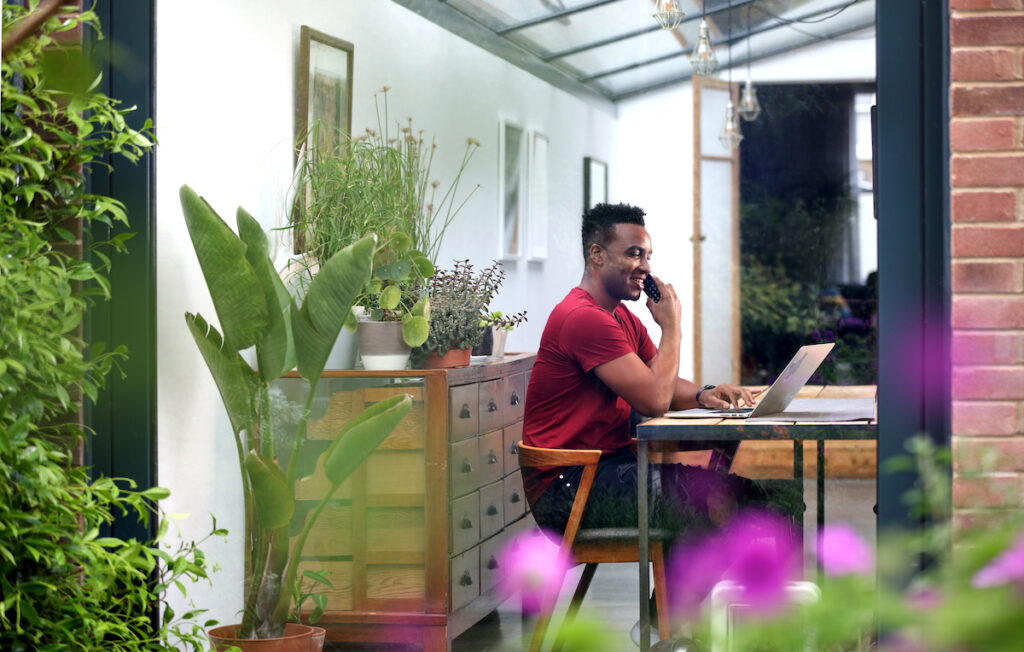BT Group plc (trading as BT and formerly British Telecom) is a British multinational telecommunications holding company headquartered in London, England. It has operations in around 180 countries and is the largest provider of fixed-line, broadband and mobile services in the UK, and also provides subscription television and IT services.
The Exponential Roadmap Initiative spoke to BT Group in November 2021 to find out more about BT Group’s race to halve Emissions by 2030. As members of the Exponential Roadmap Initiative, BT Group supports the 1.5°C Business Playbook– a guideline for exponential climate action- and are taking action across the 4 Climate Pillars of the Playbook. This year, we spoke to BT Group about the fourth climate pillar- how the company is influencing climate action in society.
Pillar 4 – influencing climate action in society – what is an example of an initiative from BT Group in this area?
Pillar 4 is about “becoming a climate leader by using your company network and wider sphere of influence to support and accelerate climate action in line with the 1.5°C ambition.” And this is something BT Group does a lot, and below is one example.
In spring 2021, BT Group ran the Smarter Living Challenge in partnership with environmental charity Hubbub. The challenge invited consumers and BT colleagues from 61 diverse households to take part in a three-month pilot to trial different approaches to living more sustainably at home.
Participants were set regular challenges and supported with help and advice to help them reduce their heating and hot water usage; manage their power and lighting; and to reduce food waste. The project also looked to identify where technology could be used to improve these actions or make them easier to carry out.
55 households completed the challenge, taking a total of 448 actions. Based on the participants’ progress, seven high-impact actions were identified:
- Switching to a renewable energy provider/ tariff
- Turning thermostat down one degree
- Turning appliances you don’t use from ‘standby’ to ‘off’
- Cycling or walking for shorter journeys
- Reducing food waste
- Repairing old tech items
- Having shorter showers
“The 1.5°C Business Playbook provides a guide for companies on how to reach their 1.5°C pathways and builds on the latest science and best practice. We’re encouraging more organisations to join us in setting their own science-based net zero targets, thereby driving themselves, industry, and policymakers to develop the right conditions for quicker, more impactful climate action,” Gabrielle Ginér, Head of Environmental Sustainability, BT Group.
What impact did the campaign have?
The 2021 study found that if these seven actions were adopted on a sustained basis, an average household could save £938 on their bills and up to 1.7 tonnes of CO2e per year.
These actions would help to support the carbon reduction required of households in line with the UK Government’s commitment for the country to become net-zero by 2050.
BT Group revisited the study a year on, in June 2022, and found that households who make small but sustainable lifestyle changes around the home point to smart tech as the key driver of reducing emissions and energy usage.
Many households have introduced smart technology, such as smart plugs, voice-activated devices, and smart meters, giving them more control over their energy consumption. Almost half (45%) also said technology that monitors or tracks energy makes it easier to see the difference they can make.
Almost two thirds (62%) of the households have since reintroduced one or more of the sustainable living actions they tried during the original Smarter Living Challenge, due to the rising cost of living. The same percentage of households (62%) also said that the changes they made during and since the challenge have helped them feel more in control of their household’s energy consumption. A third (31%) of the Smarter Living Challenge revisited households said that their energy bills had not risen as much as they might have done, as a result of the actions they have implemented.
Helping households make more sustainable choices forms part of BT Group’s plans to help customers avoid 60 million tonnes of CO2 by 2030.
Full details of the original study can be found here:
Associated press releases can be found here:
- Cost conscious Brits turn to smart tech to reduce energy use and tackle climate change (bt.com)
- BT Smarter Living Challenge uncovers steps to sustainable living in the UK

